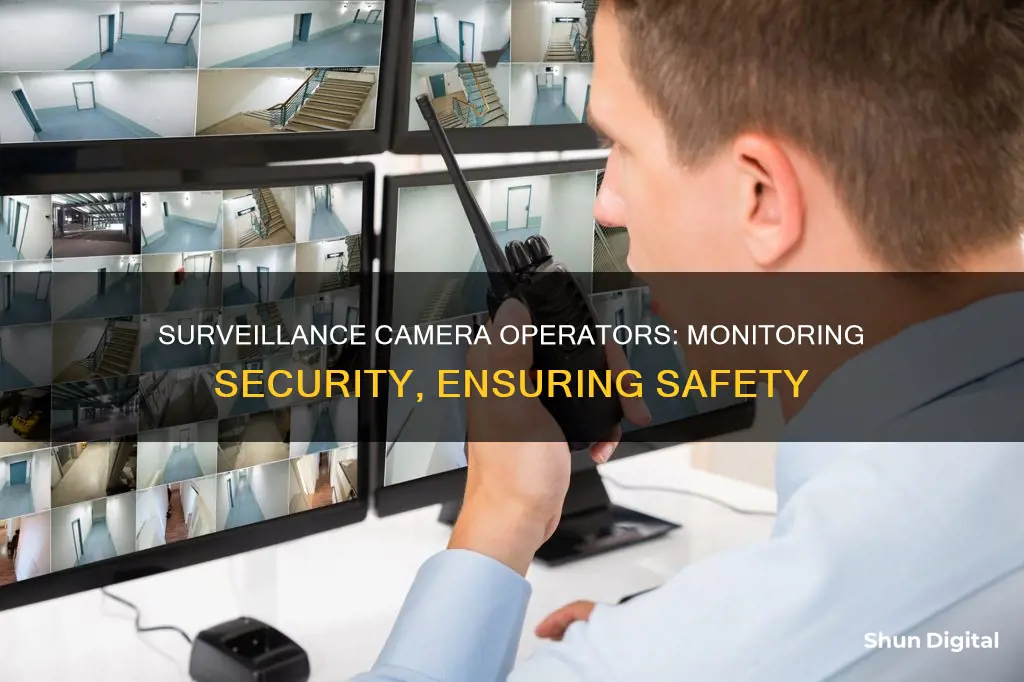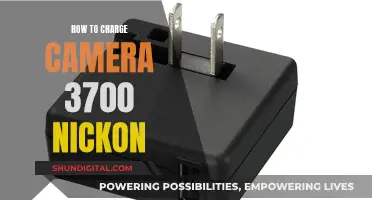
The job title for someone who watches surveillance cameras is most commonly known as a CCTV Operator, Surveillance Operator, or Security Camera Observer. These professionals are responsible for monitoring and analyzing live or recorded video footage from security or surveillance cameras to ensure the safety and security of a particular area, property, or individuals. They may work in settings such as retail stores, banks, casinos, hotels, sports venues, airports, and government buildings. The role has become increasingly important due to rising crime rates, security concerns, and the need for compliance with safety protocols. Surveillance operators are expected to have strong attention to detail, good technical skills, and the ability to work independently and under pressure.
| Characteristics | Values |
|---|---|
| Job Title | Surveillance Operator, CCTV Operator, Surveillance Monitor, Security Camera Observer, Video Surveillance Specialist |
| Role | Monitor and analyse live or recorded video footage to ensure the safety and security of a particular area or property |
| Skills | Strong attention to detail, ability to multitask, excellent communication skills, technical skills, good memory for keeping notes |
| Work Setting | Retail stores, banks, casinos, airports, government buildings |
| Salary | $11-16 per hour, $27,800-$41,487 per year |
What You'll Learn
- Surveillance operators monitor and analyse footage to ensure safety and security
- They work in a range of settings, from retail stores to government buildings
- Surveillance operators require strong attention to detail and good communication skills
- They may also be responsible for maintaining and troubleshooting equipment
- The role has become more important due to rising crime rates and COVID-19 safety measures

Surveillance operators monitor and analyse footage to ensure safety and security
Surveillance operators, also known as CCTV operators, play a crucial role in maintaining safety and security by monitoring and analysing footage from surveillance cameras. They are responsible for ensuring the protection of a particular area or property, such as retail stores, banks, casinos, airports, and government buildings.
A typical day for a surveillance operator involves conducting thorough equipment checks to ensure all cameras are functioning and broadcasting effectively, and that video storage systems are online and ready to record. This includes tasks such as inserting videotapes into analog machines and freeing up space on digital capture drives.
During their shifts, operators continuously monitor live footage, keeping a vigilant eye for any suspicious activities or potential security threats. They are trained to identify and respond to disruptions or unlawful acts, and work closely with law enforcement to report and resolve any issues. A sharp eye for detail and strong technical skills are essential for this role, as operators must be able to operate and maintain advanced surveillance systems.
In addition to their monitoring duties, surveillance operators may also be responsible for maintaining and troubleshooting the equipment. This includes understanding the technology, identifying technical issues, and coordinating with the relevant personnel to resolve them.
The role of a surveillance operator has become increasingly important due to rising security concerns and advancements in technology. With the ability to access and monitor footage remotely, operators can now easily keep a watchful eye on multiple locations simultaneously. This has led to a growing demand for skilled surveillance operators, ensuring the continued safety and security of various premises and their occupants.
Evading Speeding Camera Tickets: Proving Someone Else Was Driving
You may want to see also

They work in a range of settings, from retail stores to government buildings
The job title for those watching surveillance cameras varies and includes surveillance operator, CCTV operator, security camera observer, video surveillance specialist, and surveillance monitor. These professionals work in a variety of settings, from retail stores to government buildings, and are responsible for monitoring and analyzing live or recorded video footage from security cameras. They ensure the safety and security of a particular area or property by identifying potential security threats, suspicious activities, and criminal behaviour, and reporting them to the appropriate authorities.
In retail stores, for example, surveillance operators may monitor customers and employees to prevent theft or vandalism. They may also be responsible for maintaining the security of the premises after closing hours. In government buildings, on the other hand, surveillance operators may focus on identifying potential security threats and coordinating with law enforcement agencies to ensure the safety of the building and its occupants.
Surveillance operators in casinos monitor gaming areas to detect any unlawful acts or disruptions. They work closely with casino security personnel to ensure the protection of the property and patrons. Similarly, in banks, surveillance operators play a crucial role in detecting and preventing robberies or fraudulent activities. They may also monitor the movement of cash and valuables within the bank.
In airports, surveillance operators are responsible for monitoring passenger and staff movements, ensuring compliance with security protocols, and detecting any suspicious activities that could pose a security risk. They work closely with airport security and law enforcement agencies to maintain the safety of the airport and its visitors.
Overall, the role of a surveillance operator is diverse and crucial in maintaining the security of various settings, including retail stores, government buildings, casinos, banks, and airports. Their attention to detail, analytical skills, and ability to work with advanced technology are essential in ensuring the safety and security of these diverse environments.
Staples: Your One-Stop Shop for Camera Battery Needs
You may want to see also

Surveillance operators require strong attention to detail and good communication skills
The job title for those watching surveillance cameras can vary, but common titles include Surveillance Operator, CCTV Operator, Surveillance Monitor, Security Camera Observer, and Video Surveillance Specialist. These professionals are responsible for monitoring and analyzing live or recorded video footage from security or surveillance cameras to ensure the safety and security of a particular area or property.
Strong communication skills are also essential for surveillance operators. They must be able to effectively communicate any potential threats or incidents to the relevant authorities, such as law enforcement or security personnel. Clear and concise communication is crucial in these situations to ensure a prompt and appropriate response. Additionally, surveillance operators may be required to provide detailed reports or testimony regarding their observations, either to law enforcement or in a court of law.
In addition to their core responsibilities, surveillance operators also play a crucial role in equipment maintenance and troubleshooting. They need to have a good understanding of the technology they are using and be able to identify and resolve any technical issues that may arise. This includes conducting regular equipment checks to ensure all cameras are functioning properly and that video storage systems have sufficient capacity.
Overall, the role of a surveillance operator is vital in maintaining the security and safety of various premises, from retail stores and banks to casinos and government buildings. Their attention to detail and strong communication skills are key components in effectively carrying out their duties and ensuring the protection of people and property.
Focusing Your S6 Camera: Tips and Tricks
You may want to see also

They may also be responsible for maintaining and troubleshooting equipment
Those working in surveillance are responsible for maintaining and troubleshooting equipment. This includes conducting routine equipment checks to ensure all cameras are functioning and broadcasting, and that video storage facilities are online and have adequate free space. They may also need to insert videotapes into analog recording machines and manage digital drive capture systems.
Surveillance operators are also tasked with identifying and resolving any technical issues that may arise. This requires a strong technical understanding of the equipment and systems, as well as good problem-solving skills. Given the importance of maintaining continuous surveillance, they must be able to troubleshoot and resolve issues promptly to minimise downtime.
In addition to their technical duties, these professionals play a crucial role in ensuring the security and integrity of the equipment. This may involve implementing access controls, authorising entry, and removing trespassers from restricted areas. They may also be responsible for training others in the use of the equipment and systems, promoting a culture of security and compliance.
With advancements in technology, the role of a surveillance operator has evolved to include remote monitoring and the use of digital tools. As such, operators must stay up-to-date with new technologies and be adaptable to changing equipment and systems. This includes keeping abreast of industry trends, such as the shift towards digital and IP-based surveillance systems, to ensure they can effectively maintain and troubleshoot modern surveillance equipment.
Surveillance in Cafes: Are You Being Watched?
You may want to see also

The role has become more important due to rising crime rates and COVID-19 safety measures
The role of a surveillance camera operator has become increasingly important in recent years due to rising crime rates and the need to ensure compliance with COVID-19 safety measures.
Surveillance camera operators, also known as CCTV operators, play a crucial role in maintaining the safety and security of areas such as retail stores, banks, casinos, airports, and government buildings. They are responsible for monitoring and analysing live and recorded video footage, identifying suspicious behaviour, and taking appropriate action to prevent any harm or damage.
The rise in crime rates, including violent crimes such as homicide and aggravated assaults, has placed greater demands on surveillance camera operators to detect and deter criminal activities. Additionally, with advancements in technology, operators can now remotely access and monitor multiple locations simultaneously, making their role even more critical in ensuring the security of various premises.
The COVID-19 pandemic has further highlighted the importance of surveillance camera operators in enforcing safety protocols and social distancing measures. Many businesses and public places have installed additional cameras to monitor the number of people entering and exiting their premises, and operators are tasked with ensuring compliance with these measures.
The combination of rising crime rates and the need for COVID-19 safety measures has led to an increased demand for security measures and surveillance camera operators. Their role in maintaining public safety and reducing the impact of criminal activities on communities has become more vital than ever.
Furthermore, surveillance camera operators are often responsible for reporting suspicious activities to law enforcement and coordinating responses to security incidents. Their ability to detect and respond to potential threats in real time helps protect people, properties, and assets. With the ongoing evolution of security challenges, the role of surveillance camera operators will likely continue to grow in importance in the coming years.
Unleashing Creative Control: Camera Raw Filter's Power
You may want to see also
Frequently asked questions
The primary duty of a surveillance operator is to maintain the control centre equipment and ensure all cameras are functioning properly. They also need to check that video storage systems have sufficient space or tapes for recording.
Throughout their shift, surveillance operators keep a written log of any suspicious activities. They collaborate with law enforcement by providing video footage and logs when incidents occur. They may also be called to testify in court about their observations or the technical details of the recording system.
A high school diploma or GED is typically the minimum educational requirement. A sharp eye for detail, strong technical skills, and good memory are important for this role. Previous experience in the military or police force is advantageous.
According to the Bureau of Labor Statistics, the average salary for security guards, including those specialising in video surveillance, was $33,030 in 2019. The job outlook is expected to have a 3% growth through 2029, which is about average. However, advancements in technology may lead to a reduced need for security professionals.







